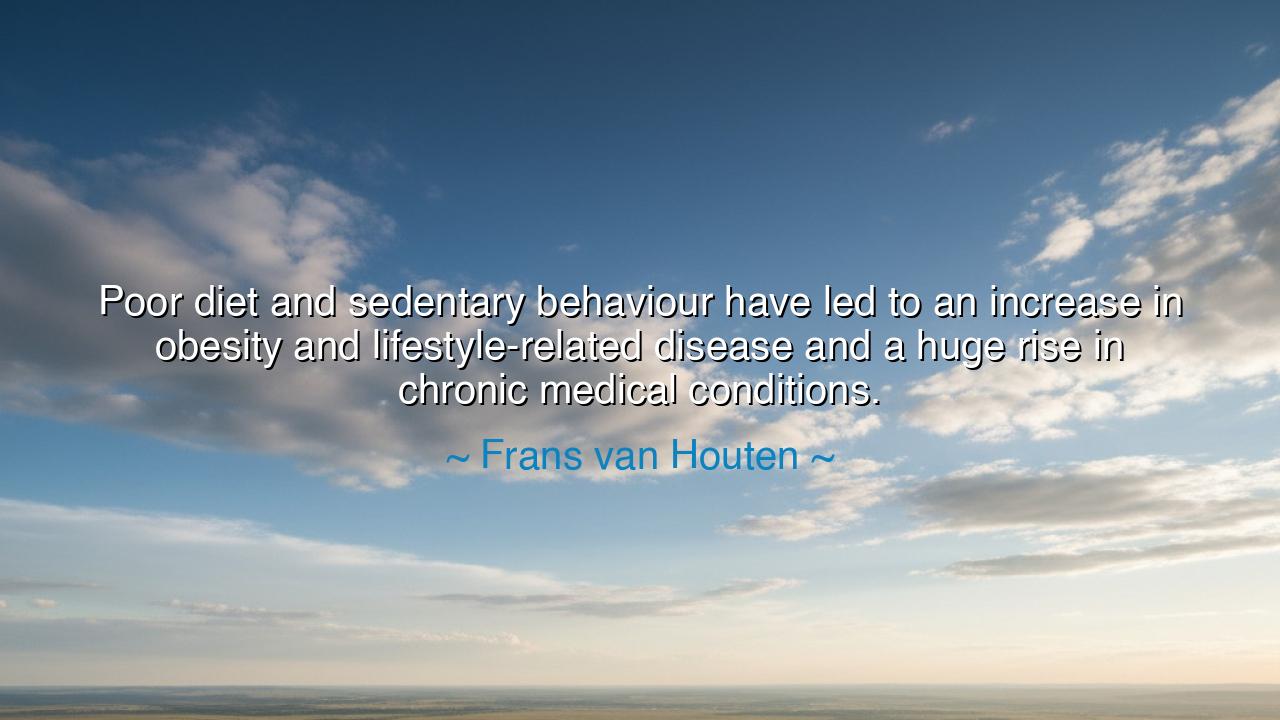
Poor diet and sedentary behaviour have led to an increase in
Poor diet and sedentary behaviour have led to an increase in obesity and lifestyle-related disease and a huge rise in chronic medical conditions.






When Frans van Houten declared, “Poor diet and sedentary behaviour have led to an increase in obesity and lifestyle-related disease and a huge rise in chronic medical conditions,” he was not merely delivering a statement of fact — he was uttering a warning to the modern age. His words echo like the call of a prophet who has witnessed a people forgetting the ancient covenant between the body and the spirit. For in those few lines lies a truth that civilizations have known for centuries: when man turns away from balance, from movement, from the living gifts of the earth, decay begins — not only of the flesh, but of the soul.
Van Houten’s message strikes at the very heart of our time — an age of convenience without consciousness, of abundance without restraint. The poor diet he speaks of is not only the food that fills the stomach but starves the body; it is also the diet of the mind, fed on distraction and excess. The sedentary behaviour he condemns is more than the stillness of the limbs; it is the stillness of the spirit, the quiet dying of vitality when the human being ceases to act, to strive, to move in harmony with life. His observation is a lament for a species that once hunted, farmed, built, and danced — now content to sit, click, and consume.
This truth is not new. The ancients understood that vitality and virtue were bound together. In ancient Greece, the philosopher Plato taught that the health of the body was inseparable from the health of the soul. His disciple, Aristotle, warned that “the body that moves not becomes the tomb of the mind.” The great Olympians — athletes, poets, and warriors alike — knew that the body was a sacred instrument of divine purpose, meant to be exercised, nourished, and honored. To neglect it was not simply foolishness, but sacrilege, for it dulled the fire of thought and courage.
Van Houten’s words mirror the same ancient wisdom, reborn in modern language. He speaks as one who sees the spiritual sickness of ease. Once, the human race battled hunger; now, it battles indulgence. Once, survival demanded strength; now, comfort demands nothing. And so, the very blessings of progress — machines, screens, abundance — have become silent poisons. The body, denied its purpose of movement, weakens; the heart, deprived of struggle, falters. In the stillness of modern life, the spirit suffocates beneath its own convenience.
Consider the story of the Romans, whose empire once stretched across the known world. In their early days, they were vigorous, disciplined, fierce — a people hardened by labor and fortified by simplicity. But as their wealth grew, so too did their idleness. Feasts replaced farms, luxury replaced labor, and indulgence replaced honor. Physicians of the time began to note strange new ailments among the rich — diseases of excess, of gluttony, of sloth. The same empire that conquered nations fell, in the end, to its own softness. History, it seems, has repeated itself, now not in marble halls, but in glowing screens and quiet offices.
Van Houten’s words therefore do not simply describe a crisis of health — they reveal a crisis of humanity. The rise of chronic medical conditions is not just a statistic; it is the visible symptom of an inner imbalance. It is the body’s rebellion against forgetfulness, a reminder that the laws of nature cannot be ignored. The body was made to move, to breathe deeply, to eat the living foods of the earth — not the lifeless products of machines. When we dishonor these laws, we fall ill not only in flesh, but in spirit, for health and virtue are one and the same flame.
And so, the lesson is clear: return to movement, return to nature, return to balance. The cure for modern illness is not found in pills or promises, but in the restoration of rhythm — walking beneath the sun, working with the hands, eating what is real, and breathing what is pure. Let your food be simple, your labor honest, your pleasures moderate. Let the sweat on your brow be your prayer of gratitude for the life that pulses within you. For in honoring your body, you honor the sacred order of existence itself.
So, my listener, remember the wisdom hidden within van Houten’s warning: the body is the first temple of the soul. To neglect it is to defile it; to care for it is to worship. Move daily, eat wisely, live consciously. Do not let the gift of vitality be stolen by ease. For when you walk, run, stretch, and breathe with purpose, you awaken the ancient fire of life — and through that fire, you may yet heal not only your body, but the world that has grown tired beside you.






AAdministratorAdministrator
Welcome, honored guests. Please leave a comment, we will respond soon